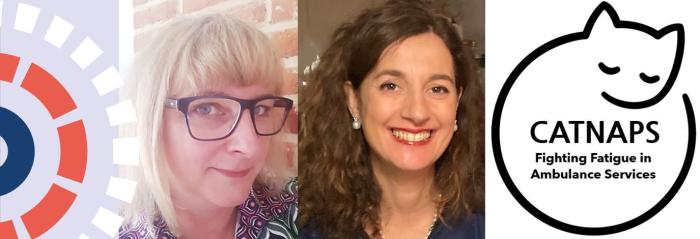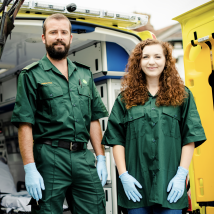For Sleep Awareness Week (10-16 March), mental health theme lead Professor Kristy Sanderson shares how the CATNAPS project with ARC East of England is helping to fight fatigue in ambulance services.

The idea for CATNAPS emerged over a couple of years, as ambitious research projects often do! My team at the University of East Anglia were initially approached by our local ambulance service who wanted to work with us on a staff wellbeing project, and sleep health emerged as an area of concern in early conversations.
We fortunately received some seed funding from the former CLAHRC, now ARC East of England, to gain crucial insights into the scale of the problem and what changes would help staff manage their fatigue on shift. With support from the NIHR Health and Social Care Delivery programme, we were able to scale up the study nationally into CATNAPS with UEA Senior Research Associate Chiara Lombardo (pictured right, above), and start designing a new approach to tackle fatigue and promote better sleep health for staff in ambulance services across the UK.
This study developed, and is being delivered, in partnership with South East Coast Ambulance Service NHS Foundation Trust, East of England Ambulance Service NHS Trust, Scottish Ambulance Service, East Midlands Ambulance Service, Association of Ambulance Chief Executives, the Health and Safety Executive, and the Universities of East Anglia and Hertfordshire.
Ambulance service frontline staff and senior leaders have shaped the design and delivery of this study, and an extensive consultation period informed the research proposal with every NHS ambulance service in the UK (including Scotland, Wales and Northern Ireland). We involved senior managers in ambulance services responsible for working conditions and supporting staff wellbeing, unions, and fatigue management experts.
“…CATNAPS will not only be beneficial for staff but will be beneficial for patients as well for the care they will get from the service.”
Frontline staff participant, CATNAPS study
"Fatigue can impact on your health in terms of catching simple infections and stuff, …so if you're less fatigued, you're probably less likely to go off sick because you're not gonna pick things up. If we can evidence [fatigue management] in CATNAPS it's a very positive thing to do."
Frontline staff participant, CATNAPS study
We also worked with patient and public representatives who guided our aims to reflect their priorities, focussing on how ambulance services may be impacted and improved by managing fatigue better and how patients and public would view the changes.
Our patient co-investigator, Mr Jeremy Dearling, is a full member of the research team contributing to the design of recruitment materials, interview questions, facilitating co-design workshops, and helping with our thematic analysis of interviews with staff and patients.
“When COVID happened, we heard about the fatigue and the stress levels of nurses and doctors, but we never ever heard about the stress levels and the fatigue of the ambulance service, which I'm sure must have been incredible, but we never heard about it.”
Patient participant, CATNAPS study
We are still in the middle of this study, but we’ve already found a great appetite to consider fatigue management from a systems perspective, rather than looking at changes - such as reorganising rosters - in isolation. We need to think holistically across all parts of ambulance service operations and look for opportunities for Trusts to change practice and help staff think about their sleep health in new ways.
Best practice from industries that have long track records in managing staff fatigue has guided us towards a suite of fatigue prevention and mitigation interventions for ambulance Trusts to consider. These include actions for rostering teams, staff wellbeing leads, safety and governance leads, human resources, clinical operations, and staff themselves.
The fatigue risk management system (FRMS) has essentially been developed by the ambulance sector for ambulance service staff. In the next phase of implementation, we will be supporting ambulance services to try out the FRMS guidance to ensure it is fit for purpose to use with their staff in each region of the UK. Ultimately, we hope that a holistic approach to improve fatigue management will reduce fatigue levels in staff, help them sleep better, and lead to improved staff and patient safety.
We have just completed staff and patient interviews in two ambulance Trusts and are opening recruitment shortly in two more. We are also about to embark on an observational ethnography to get a first-hand view of life on the frontline of ambulance services. Our research team will be out on the road with ambulance crews and sitting with call handlers in the Emergency Operations Centre, throughout day and night shifts.
People can follow us on our journey by tuning in to our new podcast series to look behind-the-scenes at how a study like CATNAPS is done. These podcasts are the brainchild of our patient co-investigator Jeremy Dearling who writes and hosts each one.
